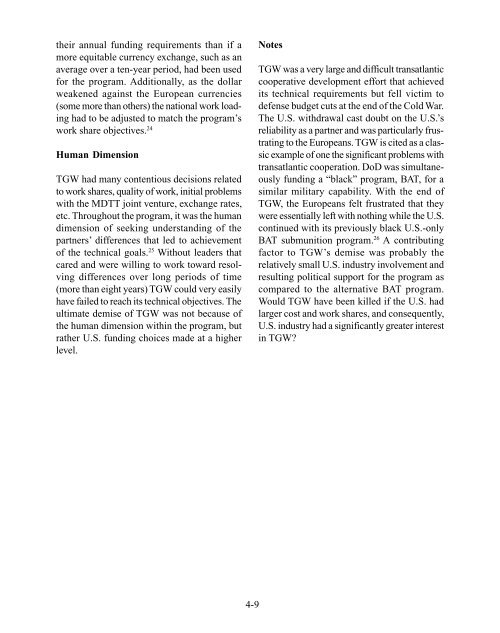Transatlantic Armaments Cooperation - Federation of American ...
Transatlantic Armaments Cooperation - Federation of American ...
Transatlantic Armaments Cooperation - Federation of American ...
You also want an ePaper? Increase the reach of your titles
YUMPU automatically turns print PDFs into web optimized ePapers that Google loves.
their annual funding requirements than if a<br />
more equitable currency exchange, such as an<br />
average over a ten-year period, had been used<br />
for the program. Additionally, as the dollar<br />
weakened against the European currencies<br />
(some more than others) the national work loading<br />
had to be adjusted to match the program’s<br />
work share objectives. 24<br />
Human Dimension<br />
TGW had many contentious decisions related<br />
to work shares, quality <strong>of</strong> work, initial problems<br />
with the MDTT joint venture, exchange rates,<br />
etc. Throughout the program, it was the human<br />
dimension <strong>of</strong> seeking understanding <strong>of</strong> the<br />
partners’ differences that led to achievement<br />
<strong>of</strong> the technical goals. 25 Without leaders that<br />
cared and were willing to work toward resolving<br />
differences over long periods <strong>of</strong> time<br />
(more than eight years) TGW could very easily<br />
have failed to reach its technical objectives. The<br />
ultimate demise <strong>of</strong> TGW was not because <strong>of</strong><br />
the human dimension within the program, but<br />
rather U.S. funding choices made at a higher<br />
level.<br />
4-9<br />
Notes<br />
TGW was a very large and difficult transatlantic<br />
cooperative development effort that achieved<br />
its technical requirements but fell victim to<br />
defense budget cuts at the end <strong>of</strong> the Cold War.<br />
The U.S. withdrawal cast doubt on the U.S.’s<br />
reliability as a partner and was particularly frustrating<br />
to the Europeans. TGW is cited as a classic<br />
example <strong>of</strong> one the significant problems with<br />
transatlantic cooperation. DoD was simultaneously<br />
funding a “black” program, BAT, for a<br />
similar military capability. With the end <strong>of</strong><br />
TGW, the Europeans felt frustrated that they<br />
were essentially left with nothing while the U.S.<br />
continued with its previously black U.S.-only<br />
BAT submunition program. 26 A contributing<br />
factor to TGW’s demise was probably the<br />
relatively small U.S. industry involvement and<br />
resulting political support for the program as<br />
compared to the alternative BAT program.<br />
Would TGW have been killed if the U.S. had<br />
larger cost and work shares, and consequently,<br />
U.S. industry had a significantly greater interest<br />
in TGW?
















